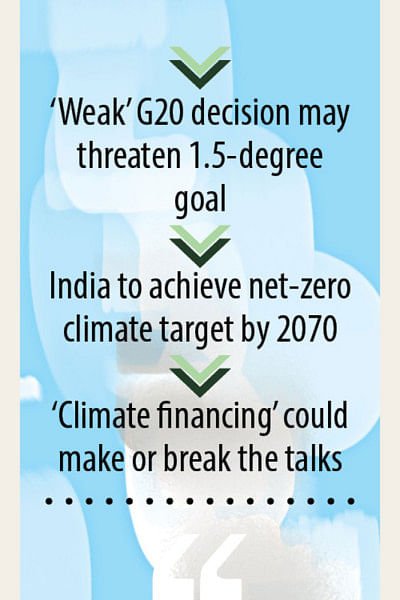‘We are digging our own graves’
"This is not a drill. It's code red for the Earth. Millions will suffer as our planet is devastated - a terrifying future that will be created, or avoided, by the decisions you make. You have the power to decide."
World leaders must act to "save humanity", UN chief Antonio Guterres said yesterday as they met for the historic COP26 climate summit with code-red warnings from scientists ringing in their ears.
More than 120 heads of state and government are gathering in Glasgow for a two-day summit at the start of the UN's COP26 conference, which organisers say is crucial for charting humanity's path away from catastrophic global warming.
"It's one minute to midnight... and we need to act now," British Prime Minister Boris Johnson said to start proceedings on an at-times chaotic opening day.
COP26 is being billed as vital for the continued viability of the Paris Agreement, which countries signed in 2015 by promising to limit global temperature rises to "well below" two degrees Celsius, and to work for a safer 1.5C cap.
With a little over 1C of warming since the Industrial Revolution, Earth is being battered by ever more extreme heatwaves, flooding and tropical storms supercharged by rising seas.
As Johnson took the stage, Swedish activist Greta Thunberg retweeted an appeal for her millions of supporters to sign an open letter accusing leaders of betrayal.
"This is not a drill. It's code red for the Earth," it read. "Millions will suffer as our planet is devastated -- a terrifying future that will be created, or avoided, by the decisions you make. You have the power to decide."
Pressure is on governments to redouble their emissions-cutting commitments to bring them in line with the Paris goals, and to stump up long-promised cash to help developing nations green their grids and protect themselves against future disasters.
"It's time to say: enough," Guterres said.
"Enough of brutalizing biodiversity. Enough of killing ourselves with carbon. Enough of treating nature like a toilet. Enough of burning and drilling and mining our way deeper. We are digging our own graves."
Johnson spoke of the "uncontainable" public anger if the conference falls flat.
Echoing Greta Thunberg -- who is in Glasgow with thousands of other protesters -- he urged the summit against indulging in "blah blah blah".
If the leaders "fluff our lines or miss our cue", generations as-yet unborn "will not forgive us", the prime minister said.
"They will know that Glasgow was the historic turning point when history failed to turn."
US President Joe Biden pledged that his country will fulfill its climate goals.
The task of the COP26 conference was made even more daunting by the failure of the Group of 20 major industrial nations to agree ambitious new commitments at a weekend summit in Rome.
The G20 including China, India and Western nations committed on Sunday to the Paris goal of limiting global warming to 1.5C. They also agreed to end funding for new coal plants abroad without carbon capturing technology by the end of 2021.
But the precise pathway to 1.5C was left largely undefined and campaigners expressed disappointment with the group, which collectively emits nearly 80 percent of global carbon emissions.
At the G20, Biden singled out China and Russia, neither of which sent its leader to Glasgow, for not bringing proposals to the table.
Observers say the Glasgow gathering, which runs until November 12, will be tough going.

Most nations have already submitted their renewed emissions cutting plans -- known as "nationally determined contributions", or NDCs -- in advance of COP26. But even these current commitments -- if followed -- would still lead to a "catastrophic" warming of 2.7 Celsius, according to the UN.
Prime Minister Narendra Modi yesterday announced that India's economy would become carbon neutral by the year 2070. India is the last of the world's major carbon polluters to announce a net-zero target, with China saying it would reach that goal in 2060, and the US and the EU aiming for 2050.
"Climate financing" could make or break the talks. The failure of rich countries to deliver $100 billion annually to help climate vulnerable nations adapt to climate change might generate mistrust and reluctance among some developing nations to accelerate their emissions reductions.
The goal -- meant to be delivered last year -- has been postponed to 2023, exacerbating tensions between richer nations, responsible for global warming, and those poorer countries who are the victims of its effects.
Two days of speeches by world leaders will be followed by technical negotiations. Any deal may not be struck until close to or even after the event's Nov 12 finish date.

 For all latest news, follow The Daily Star's Google News channel.
For all latest news, follow The Daily Star's Google News channel. 



Comments